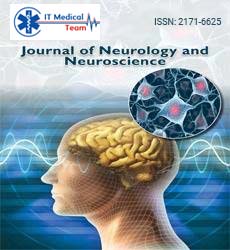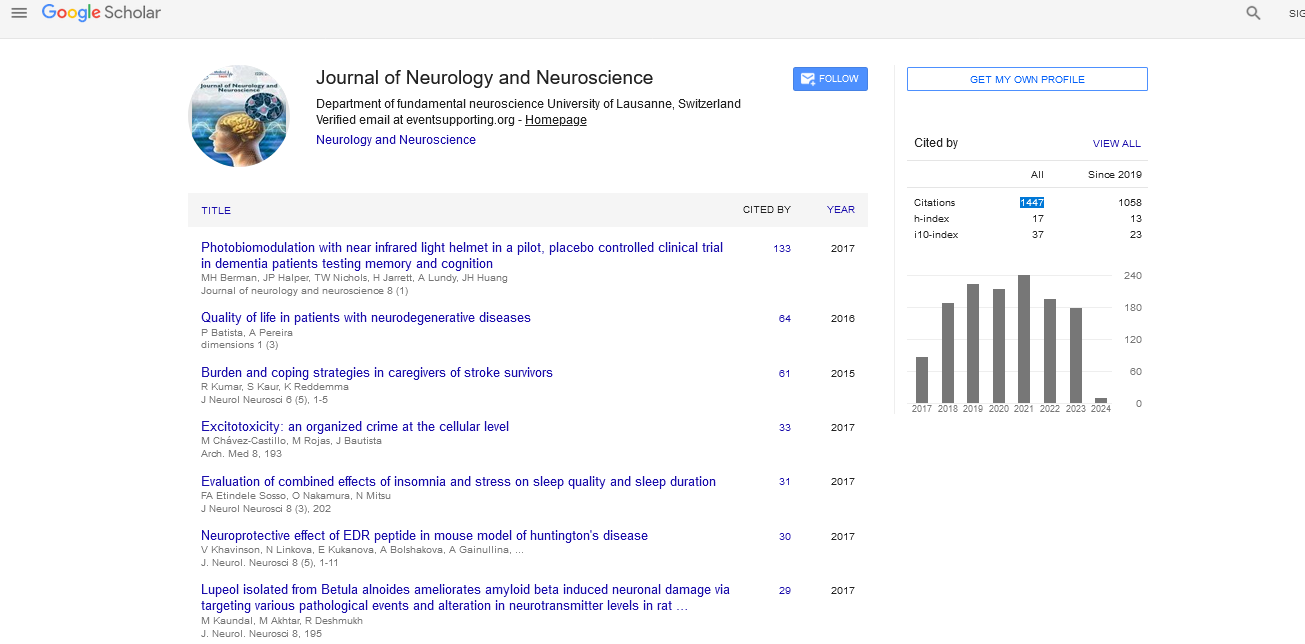Commentary Article - (2023) Volume 0, Issue 0
Post-Intensive Care Syndrome (PICS-p): The Evolving Concerns of Pediatric Intensivists
Katherine V Biagas*
The Renaissance School of Medicine at Stony Brook University, Stony Brook, New York, USA
*Correspondence:
Katherine V Biagas,
The Renaissance School of Medicine at Stony Brook University, Stony Brook, New York,
USA,
Email:
Received: 02-Jun-2023, Manuscript No. IPJNN-23-13793;
Editor assigned: 06-Jun-2023, Pre QC No. IPJNN-23-13793 (PQ);
Reviewed: 20-Jun-2023, QC No. IPJNN-23-13793;
Revised: 27-Jun-2023, Manuscript No. IPJNN-23-13793 (R);
Published:
04-Jul-2023, DOI: 10.4172/2171-6625.23.S7.005
Description
In 1983, Pediatric ICUs became officially recognized by the
AAP and SCCM as discrete specialty units dedicated to the care
of critically ill infants and children [1,2]. Initial focus was on
establishing places where children with acute life-threatening
conditions received highly specialized care [3]. In one report,
10% of children died during PICU hospitalization with another
10% dying after PICU stay. Functional outcome of survivors
seemed rosy with 91% deemed “likely to be able to lead an
independent existence” [4]. Over the next three decades, PICU
survivorship dramatically improved to a mortality of 2% or less.
The focus has changed to acquired morbidities and post PICU
problems. Parents report problems with concentration, eating,
sleeping, and behavior, delayed psychomotor development,
temporary voice changes, withdrawal symptoms, and poor
school performance [5,6]. The term Post Intensive Care
Syndrome-Pediatrics (PICS-p) has been recently adopted.
In 2015, work began among 83 investigators of the POST-PICU
group of the Pediatric Acute Lung Injury and Sepsis Investigators
(PALISI) to characterize the existing literature of PICU
survivorship. In a Scoping Review, 407 English language
publications in the domains of Overall Health, Social, Cognitive,
Emotional, Physical, Health-Related Quality of Life (HRQoL), and
Family Functioning were identified [7]. Reflecting the increased
appreciation in importance, 87% of these were published after
2000. Furthermore, a post-PICU Core Outcome Set (COS) was
developed, using a modified Delphi process, with input from
researchers, clinicians, and family advocates [8]. A COS of four
Global Domains (Cognitive, Emotional, Physical and Overall
Health) and four Specific Outcomes (HRQoL, Pain, Survival and
Communication) were recommended. An Extended COS,
including outcomes felt to be important by families, describe
additional concerns in Overall Health, and Family, Emotional, and
Physical Function [9].
Perhaps of greater interest to the readers of this journal is the
experience in examining neurocognitive outcomes. In a second
Scoping Review, we noted a lack of consensus as to methods and
study designs. 114 instruments evaluated neurocognitive
function in 183 manuscripts with, again, increased publication
record since 2000 (83% of manuscripts). Final follow up varied from 1 month to 3 years with studies variably anchored to date
of admission or PICU or hospital discharge [10]. More than half
of manuscripts focused on those with anticipated neurologic
injury. Patients with congenital heart disease, traumatic brain
injury, and cardiac arrest were most commonly evaluated [11].
Despite this literature record, two important areas of inquiry
have been studied in only limited fashion. The first is whether
neurocognitive deterioration after PICU stay is experienced by
children with underlying neurologic conditions? There are
suggestions that this may be the case. HRQoL among children
with prior severe developmental disability deteriorates during
the first year following septic shock [12]. In a single center study,
only 21.4% of children with prior neurodevelopmental
disabilities had good quality of life at 6 to 25 months after PICU
discharge [13]. The second is whether there are correlates
between adverse PICU events and subsequent neurocognitive
dysfunctions? There is some evidence that those who are
sickest, and perhaps those who experience adverse events, may
experience neurodevelopmental or behavioural sequelae. In a
state-wide database study, previously healthy children
hospitalized with critical respiratory illness developed
subsequent mental disorders or were prescribed psychotropic
medications when compared with children who did not require
mechanical ventilation [14]. In a multi-state database search,
neurologic and functional morbidities were also more common
in subjects receiving mechanical ventilation [15]. In children with
critical illness-associated-hyperglycemia, the proportion of those
with psychosocial impairment was greater in those who
experienced any hypoglycemic event [11]. Finally, children with
respiratory failure requiring mechanical ventilation had
statistically lower scores than matched siblings on Wechsler
Intelligence Subscales [16].
The evolving literature and the post-PICU COS suggest that
adaptive behaviour and HRQoL may be the important measures
of functioning in PICU survivors. In a single center study of 65
critically ill children, mean adaptive behaviour and quality of life
ratings were moderately low and poor, respectively, compared
with scale norms [17]. Moreover, worse adaptive behaviour
performance was independently associated with pre-morbid
neurologic functioning and ICU events such as prolonged cardiac
compression [17]. In the final analysis, outcomes that seem to be of real importance to PICU survivors and their families is how
these children develop, adapt, and function in a complex world
and how much residual conditions affect their overall health.
Consent for Publication
Not applicable
Funding
Not applicable
Conflicts of Interest
None
Off Label use Discussion
None
Author’s Contribution
KVB conceived of the content, performed all literature
searches, and all writing of the manuscript.
References
- Guidelines for pediatric intensive care units(1983) Committee on Hospital Care and Pediatric Section of the Society of Critical Care Medicine. Pediatrics 7:364-372.
- Guidelines and levels of care for pediatric intensive care units (1993) Committee on Hospital Care and Pediatric Section of the Society of Critical Care Medicine. Pediatrics 92:166-175.
- Pollack MM, Cuerdon TC, Patel KM, Ruttimann UE, Getson PR (1993) Pediatric intensive care units: Results of a national survey. Crit Care Med 21:607-614.
[Crossref] [Google scholar] [PubMed]
- Butt W, Shann F, Tibballs J, Williams J, Cuddihy L (1990) Long-term outcome of children after intensive care. Crit Care Med 18:961-965.
[Crossref] [Google scholar] [PubMed]
- Pollack MM, Holubkov R, Funai T, Clark A, Berger JT (2014) Pediatric intensive care outcomes: development of new morbidities during pediatric critical care. Pediatr Crit Care Med 15:821-827.
[Crossref] [Google scholar] [PubMed]
- Knoester H, Bronner MB, Bos AP, (2008) Surviving pediatric intensive care: physical outcome after 3 months. Intensive Care Med 34:1076-1082.
[Crossref] [Google scholar] [PubMed]
- Maddux AB, Pinto N, Fink EL, Hartman ME, Nett S (2020) Post-discharge outcome domains in pediatric critical care and the instruments used to evaluate them: a scoping review. Crit Care Med 48:e1313-e1321.
[Crossref] [Google scholar] [PubMed]
- Fink EL, Jarvis JM, Maddux AB, Pinto N, Galyean P (2020) Development of a core outcome set for pediatric critical care outcomes research. Contemp Clin Trials 91:105968.
[Crossref] [Google scholar] [PubMed]
- Fink EL, Maddux AB, Pinto N, Sorenson S, Notterman D (2020) A core outcome set for pediatric critical care. Crit Care Med. 48:1819-1828.
[Crossref] [Google scholar] [PubMed]
- Biagas KV, Heneghan JA, Abu-Sultaneh S, Geneslaw AS, Maddux AB (2023) Scoping Review: Neurocognitive Outcome Assessments After Critical Illness in Children. J Intensive Care Med 38:358-367.
[Crossref] [Google scholar] [PubMed]
- Biagas, KV, Hinton VJ, Hasbani NR, Luckett PM, Wypij D (2020) Long-term neurobehavioral and quality of life outcomes of critically ill children after glycemic control. J Pediatr 218:57-63.
[Crossref] [Google scholar] [PubMed]
- Meert KL, Reeder RW, Maddux AB, Banks R, Berg R (2021) Health-Related Quality of Life after Community-Acquired Septic Shock in Children with Pre-existing Severe Developmental Disabilities. Pediatr Crit Care Med 22:e302-e313.
[Crossref] [Google scholar] [PubMed]
- Mestrovic J, Kardum G, Sustic A, Polic B, Mestrovic M (2007) Neurodevelopmental disabilities and quality of life after intensive care treatment. J Paediatr Child Health 43:673-676.
[Crossref] [Google scholar] [PubMed]
- Geneslaw AS, Lu Y, Miles CH, Hua M, Cappell J (2021) Long-term increases in mental disorder diagnoses after invasive mechanical ventilation for severe childhood respiratory disease: A propensity matched observational cohort study. Pediatr Crit Care Med 22:1013-1025.
[Crossref] [Google scholar] [PubMed]
- Shein SL, Slain KN, Clayton JA, McKee B, Rotta AT (2017) Neurologic and functional morbidity in critically ill children with bronchiolitis. Pediatr Crit Care Med 18:1106-1113.
[Crossref] [Google scholar] [PubMed]
- Watson RS, Beers SR, Asaro LA, Burns C, Koh MJ (2022) Association of acute respiratory failure in early childhood with long-term neurocognitive outcomes. JAMA 327:836-845.
[Crossref] [Google scholar] [PubMed]
- Ebrahim S, Singh S, Hutchison JS, Kulkarni AV, Sananes R (2013) Adaptive behavior, functional outcomes, and quality of life outcomes of children requiring urgent ICU admission. Pediatr Crit Care Med 14:10-18.
[Crossref] [Google scholar] [PubMed]
Citation: Biagas KV (2023) Post-Intensive Care Syndrome (PICS-p): The Evolving Concerns of Pediatric Intensivists. J Neurol Neurosci Vol.14 No.S7:005





